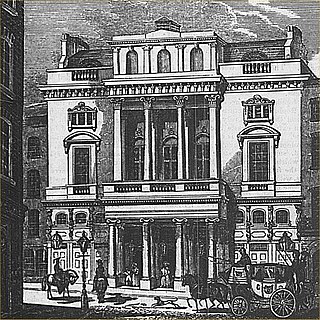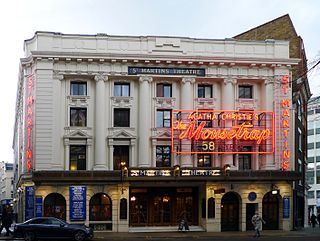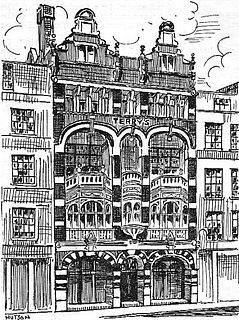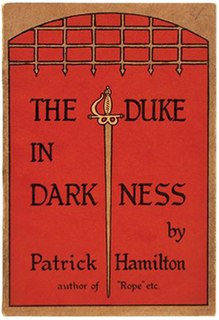
The St James's Theatre was in King Street, St James's, London. It opened in 1835 and was demolished in 1957. The theatre was conceived by and built for a popular singer, John Braham; it lost money and after three seasons he retired. A succession of managements over the next forty years also failed to make it a commercial success, and the St James's acquired a reputation as an unlucky theatre. It was not until 1879–1888, under the management of the actors John Hare and Madge and W. H. Kendal that the theatre began to prosper.

William Mervyn Pickwoad was an English actor best known for his portrayal of the bishop in the clerical comedy All Gas and Gaiters, the old gentleman in The Railway Children and Inspector Charles Rose in The Odd Man and its sequels.

St Martin's Theatre is a West End theatre which has staged the production of The Mousetrap since March 1974, making it the longest continuous run of any show in the world.

Daly's Theatre was a theatre in the City of Westminster. It was located at 2 Cranbourn Street, just off Leicester Square. It opened on 27 June 1893, and was demolished in 1937.
On Approval is a 1926 play by Frederick Lonsdale. It premiered at the Gaiety Theatre, New York, on 18 October 1926 where it ran for 96 performances. It opened in the West End of London at the Fortune Theatre on 19 April 1927 and ran until 2 June 1928.

Terry's Theatre was a West End theatre in the Strand, in the City of Westminster, London. Built in 1887, it became a cinema in 1910 before being demolished in 1923.

John Peter Wearing is an Anglo-American theatre historian and professor, who has written numerous books and articles about nineteenth and twentieth-century drama and theatre, including The Shakespeare Diaries: A Fictional Autobiography, published in 2007. He has also written and edited well-received books on George Bernard Shaw, Arthur Wing Pinero, extensive reference series on the London theatre from 1890 to 1959, and theatrical biographies, among other subjects. As a professor of English literature, Wearing has specialised in Shakespeare and modern drama.

The Duke in Darkness is a 1942 play by Patrick Hamilton. A psychological drama set during the French Wars of Religion, it was first staged on 7 September 1942 at the Royal Lyceum Theatre in Edinburgh. It ran for 72 performances at the St. James Theatre, London, and had a brief run on Broadway in 1944.
Dorothy Irene de Singleton Dewhurst was an English stage and film actress. Born in 1886 in Sale, Cheshire, England, she was married to the actor George Bernard Copping, who predeceased her. She died on 12 December 1959 in London.
As Long as They're Happy is a comedy play by the British writer Vernon Sylvaine which was first staged in 1953. A successful hit, it ran at the Garrick Theatre in the West End for 370 performances between July 1953 and May 1954. Veteran entertainer Jack Buchanan directed and starred as a stockbroker trying to cope with the extravagant behaviour of his daughters.
Will Any Gentleman? is a 1950 stage farce by the British writer Vernon Sylvaine. The play was first performed at the Royal Court Theatre in Liverpool in July 1950. It then went on to the West End, running for 364 performances at the Stand Theatre between September 1950 and July 1951. It starred Robertson Hare, who appeared in several plays by Sylvaine. Hare plays a mild-mannered bank clerk who, after a night out, is hypnotized into a much more assertive lifestyle.
Letter from Paris is a play by the British writer Dodie Smith which was first staged in 1952. After first being performed at the Theatre Royal in Brighton, it ran for 27 performances at the Aldwych Theatre in London. Inspired by Henry James's 1888 novel The Reverberator, it was not considered a success by critics. The cast included Peter Barkworth, Nicholas Phipps, Maxine Audley, Brenda Bruce and Michael Nightingale.
The Sherman Fisher Girls were a British dance troupe active in the 1930s, 1940s and 1950s. Active in variety shows on the Music Hall circuit, they also featured at the Royal Variety Show. In 1938 and 1939 they were part of the hit revue These Foolish Things at the London Palladium. They also appeared in a number of British films during the era.
Cry Liberty is a play by the British writer Esther McCracken. After a premiere at the Theatre Royal, Newcastle, the work's West End at the Vaudeville Theatre lasted for 26 performances from 21 April to 13 May 1950. It was considerably less successful than McCracken's pre-war and wartime hits such as Quiet Wedding and No Medals. The original cast included Irene Handl, Joyce Barbour, Edwin Styles and Anthony Sharp.
The Fake is a 1924 play by the British writer Frederick Lonsdale. It was staged at the Apollo Theatre in the West End with a cast that included Godfrey Tearle, Franklyn Bellamy and Allan Jeayes. Unlike most of his successful plays, generally farce-like comedies, this was intended as a serious drama although it contains a happy ending. It ran for 211 performances.
The High Road is a comedy play by the British writer Frederick Lonsdale which was first staged in 1927. Its West End run was at the Shaftesbury Theatre.
Canaries Sometimes Sing is a comedy play by the British writer Frederick Lonsdale that was first staged in 1929 at the Globe Theatre in the West End. It represented the breakthrough role as a solo performer of the French comedienne Yvonne Arnaud.

But for the Grace of God is a play by the British writer Frederick Lonsdale. A murder melodrama, different to his standard light comedies, it ran for 203 performances at St James's Theatre in the West End between 3 September 1946 and 1 March 1947. The original cast included Michael Gough, A.E. Matthews, Mary Jerrold and Yvonne Owen.
Jane is a play by the American writer S. N. Behrman, based on a 1923 story by Somerset Maugham. It was first staged in Britain December 1946 at the Grand Theatre in Blackpool. It's West End run at the Aldwych Theatre lasted for 274 performances from 29 January to 27 September 1947. The original cast included Yvonne Arnaud in the title role, as well as Irene Browne, Ursula Howells, Ronald Squire, Charles Victor. Arnaud was praised for her comic acting.











